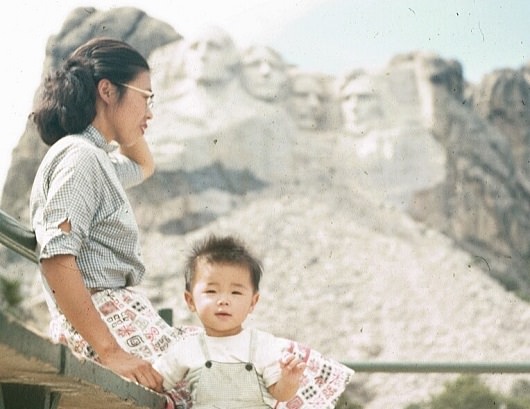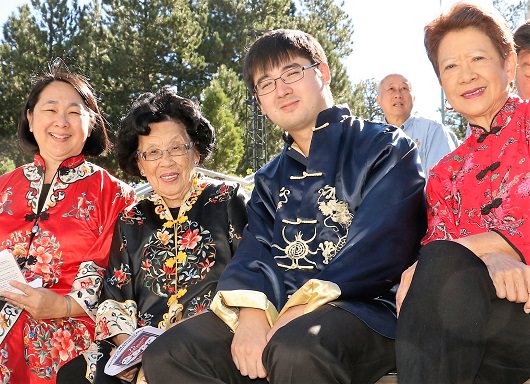Edith Wong Addresses Masons’ National Day of Celebration of the 75th Anniversary of the Completion of Mt. Rushmore
Edith C. Wong of San Luis Obispo, California, is a great-granddaughter of Deadwood Pioneer and prominent Chinese Merchant Fee Lee Wong. Fee Lee Wong arrived in Deadwood in 1876 and was a member of the community for the next 43 years before returning to China. With her mother Beatrice, Edith carries on the passion for genealogy begun by her late father Kam Leung Wong. She had made several visits to Deadwood and has published her ancestral legacy in Deadwood Magazine, South Dakota History, and the Society of Black Hills Pioneers’ Annual Heritage Book. She has joined efforts with the City of Deadwood, the Deadwood Historic Preservation Commission, the Adams Museum, Days of ’76, and Deadwood History Inc. towards preserving the Chinese History of the Black Hills.

Beatrice Wong and son Leroy at Mt. Rushmore in 1955 (photo by Kam Leung Wong)
Good morning in the beautiful Black Hills of South Dakota! Thank you Grand Master Mike Rodman for inviting me to participate in today’s celebration.
I met Mike back in 2004 in Deadwood. I could never forget his kindness and support during a large family gathering for the first reunion of the descendants of my paternal great-grandfather Fee Lee Wong.
Mike and I realize that the Masonic heritage in South Dakota has, at times, been directly connected with my ancestral heritage in the Black Hills. Those occurrences of cross-cultural brotherly friendship, although over a century old, have relevance for today: communities are bettered by a benevolent society in which individuals, and individuals as a collective give encouragement, support, and aid.
A bit about my paternal great-grandfather Fee Lee Wong:
As a young man, he traveled from Canton China to California, and eventually made his way to Deadwood South Dakota in 1876. After the gold rush began, he witnessed the influx of many ethnic groups, including the Chinese who worked in mines, restaurants, laundries, and stores. He saw the Chinese labor that built the railroad that connected the Black Hills with other parts of the United States. Unlike most, he stayed and Deadwood became his home for 43 years. He established a business, the Wing Tsue Emporium; brought back a bride after a trip to China; raised a family of eight children; participated in celebrations of his adopted country, and shared his culture with his non-Chinese neighbors.
Fee Lee Wong developed brotherly friendships with fellow Deadwood citizens, including Mason Seth Bullock and Past Grand Master of Masons of Montana Solomon Star, and Dr. Henrich Wedelstaedt. These prominent citizens and members of Deadwood Lodge #7 helped Fee Lee Wong establish a “Chinese Masonic Lodge” in 1879. The lodge was not a part of freemasonry, but nevertheless served the purpose of a benevolent society whose members took care of their fellow brothers. The Chinese Masons provided funeral ceremonies at Mt. Moriah Cemetery — as these, as well as other Chinese observances were open to the public, locals were exposed to ethnic diversity, contributing to a community bettered by tolerance of a mix of cultures.
Another illustration of brotherly bond occurred in 1904:
Due to the Chinese Exclusion Act at the time, upon returning from a trip to China, Fee Lee Wong was detained in Port Townsend, Washington. After two months, he was released and returned to Deadwood only after leading citizens testified that he was “a merchant and an honorable person to whom full faith and credit should be given.” Among the citizens that stepped forward on his behalf included Sol Star and George Ayres, Past South Dakota Grand Master. The Daily Pioneer-Times reported that Fee Lee Wong was happy to be back and relayed “that he was not afraid of being deported as he had too many good friends in Deadwood.”
Freemasons Sol Star, Seth Bullock, George Ayres and Chinese Mason Fee Lee Wong were all members of another benevolent local group, the Society of Black Hills Pioneers — for which I and other family members belong to. The Society was the first to open their arms to my father Kam Leung Wong during his genealogy search which started in 1955. The beginning of that is remembered by a treasured photo taken by my father, of my mother and my nine-month old brother and a fourteen-year-old Mt. Rushmore in the background!
After my father passed away in 2000, his genealogy passion has become mine. Encouragement and support come from my aunt Anna Woo, my mother Beatrice, my son Rob & his girlfriend Suzie who are here today, and gratefully, many more. This week, I am back to the Black Hills for the ninth time in the past 16 years. It’s not just my ancestral heritage that beckons me, it is the local people and how they are and what they do – it’s the heartfelt warmth and support, and willingness to help to contribute towards a better community. The City of Deadwood is a National Landmark. You can Google Map Chinatown, Deadwood, South Dakota and get a location for Chinatown — in reality, since 2005 there is no tangible evidence left. So for now, local Chinese history is preserved by passionate individuals and dedicated people such as those of the City of Deadwood, the Historic Preservation Commission, Deadwood History Inc., and the Society of Black Hills Pioneers, and by celebrations such as today’s by the Masons.
And lastly, an ancestral footnote:
One of Fee Lee Wong’s son, Som Quong Wong was born in Deadwood in 1889. My paternal grandfather was college educated in America as an architect and was a Captain in the Marine Corps during WWII, before passing away in California in 1959. Mason cufflinks were found amongst his remaining possessions. Was my grandfather just a fashionable guy? OR perhaps the vintage cufflinks will lead me to another connection between the Masons and the Wong family!
Thank you.

Wong family at Masons’ National Celebration at Mt. Rushmore (photo courtesy of Herb Ryan)

